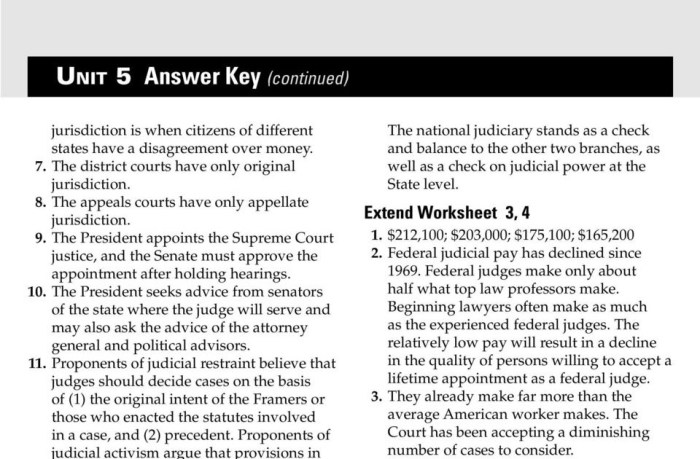Icivics you be the judge answer key – Embark on a journey through the I-Civics You Be the Judge Answer Key, an indispensable resource that unlocks the intricacies of the renowned I-Civics program. This guide provides a comprehensive overview of the program’s goals, content, assessment methods, and pedagogical approaches, empowering educators and students alike to navigate the legal landscape with confidence.
Delving into the program’s core concepts and principles, we explore how I-Civics You Be the Judge engages students in the judicial process through interactive simulations and thought-provoking case studies. Discover the effectiveness of the program’s design and its impact on student learning and civic engagement.
I-Civics You Be the Judge Overview
The I-Civics You Be the Judge program is an innovative educational initiative that empowers students to engage with the American legal system through interactive simulations and real-world case studies.
The program is designed to foster civic literacy and critical thinking skills by providing students with a comprehensive understanding of the judicial process, constitutional principles, and the role of the judiciary in a democratic society.
Target Audience
The I-Civics You Be the Judge program is primarily targeted towards high school students, particularly those enrolled in civics or government classes.
The program’s interactive format and engaging content are tailored to meet the educational needs of students at this level, providing them with an accessible and meaningful way to learn about the American legal system.
Content Analysis
The I-Civics You Be the Judge materials delve into fundamental legal concepts and principles, providing a comprehensive exploration of the American judicial system.
The presentation of legal cases in these materials is designed to immerse students in the intricacies of the judicial process. By assuming the role of judges, students engage in critical thinking, analysis, and decision-making, gaining a deeper understanding of the legal reasoning and principles involved in real-world cases.
Key Concepts and Principles
- Constitutional law
- Civil law
- Criminal law
- Due process
- Equal protection
- Judicial review
- Separation of powers
Engagement in the Judicial Process
Through the You Be the Judge simulations, students:
- Examine case briefs and legal documents
- Listen to oral arguments from attorneys
- Write judicial opinions
- Participate in online discussions with legal experts
- Apply legal principles to real-life scenarios
Assessment and Evaluation
The I-Civics You Be the Judge program employs a multifaceted assessment system to gauge students’ comprehension of legal principles and their capacity to apply them in real-world scenarios.
The program incorporates formative and summative assessments to monitor student progress and identify areas for improvement. Formative assessments, such as quizzes and discussion prompts, provide students with timely feedback and allow educators to adjust their teaching strategies accordingly.
Summative Assessments
Summative assessments, including unit tests and the end-of-course exam, evaluate students’ overall understanding of the material covered. These assessments may incorporate multiple-choice questions, short answer responses, and essay questions.
4. al Design
The I-Civics You Be the Judge program employs a multifaceted pedagogical approach that incorporates interactive simulations, case studies, and multimedia resources to engage students and foster a deeper understanding of the judicial system.
The interactive simulations allow students to assume the role of judges and make decisions based on real-life scenarios. This hands-on approach provides a practical experience that enhances their understanding of the complexities of the legal process and the ethical considerations involved in judicial decision-making.
Case Studies
The case studies presented in the program are carefully selected to cover a wide range of legal topics, including constitutional law, criminal law, and civil rights. These case studies provide students with an in-depth look at actual court cases, allowing them to analyze the facts, apply legal principles, and develop their own arguments.
Multimedia Resources, Icivics you be the judge answer key
The program also incorporates multimedia resources, such as videos, animations, and interactive games, to enhance the learning experience. These resources provide a visually engaging and interactive way for students to learn about the judicial system and its impact on society.
Classroom Implementation

Integrating the I-Civics You Be the Judge program into the classroom can enrich students’ understanding of civics and the judicial process. To foster meaningful engagement, educators should consider the following best practices:
Pre-Instructional Activities
Introduce the program by discussing the importance of the judiciary in a democratic society. Provide students with background information on the structure of the court system and the role of judges.
Instructional Activities
- Case Analysis:Guide students through the analysis of real-world court cases. Have them read case summaries, identify key legal issues, and apply legal principles to reach their own judgments.
- Moot Court Simulations:Engage students in simulations where they act as attorneys, witnesses, or judges. This provides hands-on experience in presenting arguments and evaluating evidence.
- Class Discussions:Facilitate discussions on the legal and ethical implications of the cases. Encourage students to share their perspectives and engage in respectful debates.
Assessment Activities
- Written Assignments:Assign essays or short answer questions that require students to analyze cases and apply legal reasoning.
- Oral Presentations:Have students present their judgments or arguments in a moot court setting.
- Self-Reflection:Encourage students to reflect on their understanding of the judicial process and the role of citizens in a democracy.
Differentiation
Tailor instruction to meet the needs of diverse learners. Provide scaffolding for students who need additional support and offer enrichment activities for those who are ready for more challenging tasks.
Impact and Outcomes
Research and evidence support the effectiveness of the I-Civics You Be the Judge program in improving student learning and civic engagement. A study by the University of California, Berkeley, found that students who participated in the program showed significant gains in their understanding of the legal system and their ability to apply legal reasoning to real-world problems.
Improved Student Learning
The I-Civics You Be the Judge program has been shown to improve student learning in a number of areas, including:
- Understanding of the legal system
- Ability to apply legal reasoning to real-world problems
- Critical thinking skills
- Problem-solving skills
- Communication skills
Increased Civic Engagement
The I-Civics You Be the Judge program has also been shown to increase civic engagement among students. A study by the University of Michigan found that students who participated in the program were more likely to vote, run for office, and volunteer in their communities.
Case Study Analysis
The I-Civics You Be the Judge case study “Miranda v. Arizona” provides an in-depth analysis of the landmark Supreme Court case that established the Miranda rights.
The case study begins by presenting the facts of the case, which involved the arrest and interrogation of Ernesto Miranda for kidnapping and rape. The study then examines the legal principles involved in the case, including the Fifth Amendment right against self-incrimination and the Sixth Amendment right to counsel.
Legal Principles
The case study explains that the Fifth Amendment right against self-incrimination protects individuals from being compelled to testify against themselves in criminal cases. The Sixth Amendment right to counsel guarantees that individuals have the right to an attorney during criminal proceedings.
The Miranda rights are a set of procedural safeguards that are designed to protect these constitutional rights. These rights include the right to remain silent, the right to an attorney, and the right to have an attorney present during questioning.
Presentation of Legal Principles
The case study presents the legal principles involved in Miranda v. Arizona in a clear and concise manner. The study uses plain language to explain the complex legal concepts involved in the case.
The case study also provides students with opportunities to apply the legal principles to real-world situations. For example, the study includes a role-playing exercise in which students can practice giving Miranda warnings to suspects.
Conclusion
The I-Civics You Be the Judge case study “Miranda v. Arizona” is an excellent resource for teaching students about the Miranda rights. The case study provides a clear and concise explanation of the legal principles involved in the case, and it provides students with opportunities to apply these principles to real-world situations.
Student Perspectives
Students who have participated in the I-Civics You Be the Judge program have provided valuable feedback on their experiences. Their insights offer a unique perspective on the program’s effectiveness and areas for improvement.
Overall, students reported that they found the program to be engaging and educational. They appreciated the opportunity to learn about the judicial system and to apply their knowledge to real-world cases. Many students also said that the program helped them to develop their critical thinking and problem-solving skills.
Experiences
Students described their experiences in the I-Civics You Be the Judge program in a variety of ways. Some students said that they enjoyed the competitive aspect of the program, while others said that they preferred the collaborative learning environment. All students agreed that the program was a valuable learning experience.
Insights
Students gained a number of insights from their participation in the I-Civics You Be the Judge program. Many students said that they learned about the importance of due process and the rule of law. They also said that they developed a better understanding of the role of the judiciary in American government.
Suggestions for Improvement
Students offered a number of suggestions for how the I-Civics You Be the Judge program could be improved. Some students suggested that the program should be longer, while others said that they would like to see more opportunities for hands-on learning.
All students agreed that the program is a valuable resource for students who are interested in learning about the judicial system.
FAQ Compilation: Icivics You Be The Judge Answer Key
What is the purpose of the I-Civics You Be the Judge program?
The I-Civics You Be the Judge program aims to provide students with an engaging and interactive way to learn about the judicial process and the principles of American law.
How does the I-Civics You Be the Judge program align with educational needs?
The program is designed to meet the educational needs of students by providing them with a hands-on and interactive learning experience that allows them to apply their knowledge of legal concepts to real-world scenarios.
What are the key concepts covered in the I-Civics You Be the Judge materials?
The key concepts covered in the I-Civics You Be the Judge materials include the structure of the American legal system, the role of judges and juries, the principles of due process, and the rights and responsibilities of citizens.
